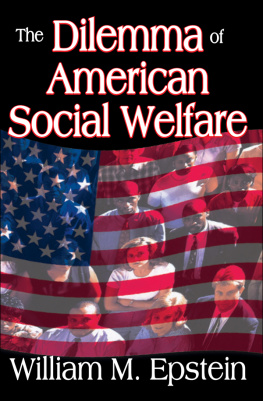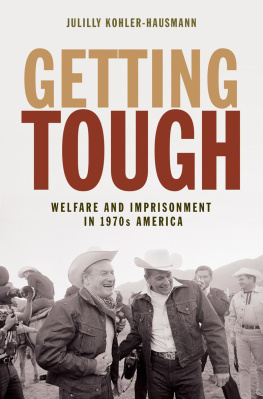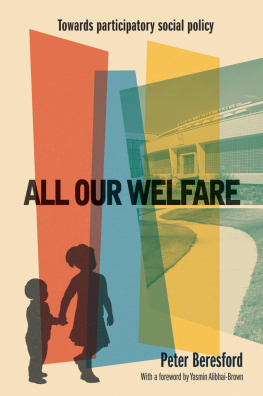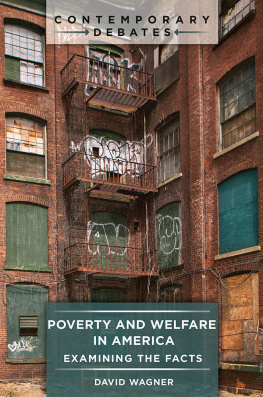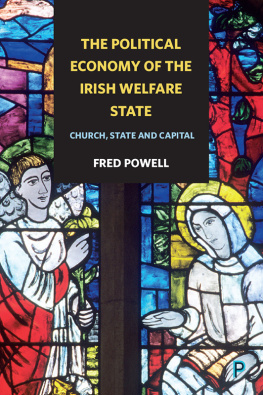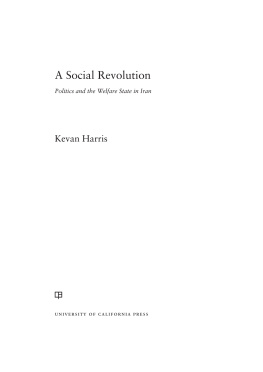Library of Congress
Cataloging-in-Publication Data
Epstein, William M., 1944
Democracy without decency : good citizenship and the war on poverty / William M. Epstein.
p. cm.
Includes bibliographical references and index.
Summary: An analysis of social and economic policies in the United States, with emphasis on the 1960s War on PovertyProvided by publisher.
ISBN 978-0-271-03584-0 (cloth : alk. paper)
1. United StatesSocial policy.
2. United StatesEconomic policy.
I. Title. HV95.E695 2010
362.50973dc22 2009034708
Copyright 2010
The Pennsylvania State University
All rights reserved
Printed in the United States of America
Published by
The Pennsylvania State University Press,
University Park, PA 16802-1003
It is the policy of The Pennsylvania State University Press to use acid-free paper. Publications on uncoated stock satisfy the minimum requirements of American National Standard for Information SciencesPermanence of Paper for Printed Library Material, ANSI Z39.481992.
This book is printed on Natures Natural, which contains 50% post-consumer waste.
The book owes an immense debt to the wonderful librarians of the University of Nevada, Las VegasSusie Skarl, Michael Frazier, Marta Sorkin, and their colleagues. The staff extended themselves past any expectation of customary service to provide bibliographic support, ready access to journal articles, and material searches. The librarians softened the shortcomings of this beleaguered public university that lacks the resources even to sustain adequate research assistance. I am also grateful to the University of Nevada, Las Vegas, for a sabbatical term.
My first readers, advisors, scholarly colleagues, and occasional graduate assistants provided invaluable support and advice: Robert Dippner, Ronald A. Farrell, Erin Friedl, Gabriela Gandarilla, Carolyn V. Grossmann, Jorge V. Grossmann, Brij Mohan, Jennifer Nutton, Leroy H. Pelton, David Smail, Frank Stricker, and Joanne Thompson.
A special note of thanks for the attentiveness, wisdom, and gentle touch of the Penn State Presss former director, Sanford G. Thatcher.
It is easy to fall into the trap of broad cultural condemnationany society but this one, any age but the presentinvoking superior conditions in other cultures as though the comparisons were informed or sensible. The critical observations in the present work are made entirely within the American tradition and loyal to the hope of social progress here at home. Other societies need to heed their own critics and their own traditions. The United States is a miracle of both achievement and disappointment and offers the eternal opportunity of an open society to reconcile the two.
The rules of good citizenship achieve mass consent in the United States through an ecology of detached role organizations rather than through deliberative democracys boast of conscious reason. A few noble individuals may live lives of blessed rationality, but they are tortured, depressed, sometimes suicidal, and always obsessed with their behaviorsjoyless narcissists. The rest of America has reached an enormous agreement over the priorities, rugged and durable through the centuries, that are embedded in the daily free choices of citizens. Planned change is improbable; the grave inadequacies of contemporary social welfare, endorsed with maddening regularity over the course of the nations history, will likely persist.
The full history of domestic social welfare is not the current concern. Rather, the period beginning after World War II is the chunk of time in which contemporary social welfare policy has emerged, engendered by traditional values but worked out through updated arrangements. Perhaps the persistence of American indifference to deprivation and needthe knowing, accepted, and even intended failure of social welfare programsmight offer a small alert, but by no means any point of optimism. Poverty persists, and deep inequality slowly corrodes the American promise.
The Introduction opens the central themeAmerican social welfare policy as the consensual, mandated choice of the American people. The auxiliary themesromanticism, social efficiency, welfare as patronage, the failure of the rational enterprise in social policymaking, and othersare developed throughout the chapters that analyze social welfare policy. The substance of the discussion involves the War on Poverty and its immediate programmatic precursors, similar programs that followed, old age insurance, public assistance, and the charitable sector. The War on Poverty, mainly conducted during the Johnson administrations Great Society of the 1960s, was the most focused effort during the contemporary period, and perhaps in American history, to address poverty. With few exceptions of limited influence, the War on Poverty and public policy in general have largely failed to reduce poverty or income inequality or to provide much income security. The charitable sector has been similarly unsuccessful, even disingenuous. The Conclusion, The Iron Sculpture, reunites the material around the process of detached role organization as the mechanism of the pervasive American consensus. Rather than usurpations of power by illegitimate elites, autonomous government action, or factional politics, that is, pluralism, the American consensus accounts for the nations institutionalized social welfare arrangements.
Many social welfare programs are covered, but some are not. Child welfare, formal public education, higher education, urban renewal and housing, most of the social insurances apart from old age insurance, among others, are redundant stories. The goal is not encyclopedic coverage but rather to lay out a theory of social welfare provision and decision making with ample evidence. The failure of social welfare policy to remedy poverty and Americas growing inequality is the occasion for an extended meditation on American society.
Preference is best defined as uncoerced choice; enduring public and private policies thus become statements of enduring national priorities. The fundamental proposition that in a free society public and private policy reflects the social will allows American values to be illuminated through the choice of public policy rather than indirectly through devices such as surveys and less structured tools. Public and private policy is probably a more accurate and reliable statement of social preference than social science analyses and historical narratives that customarily build from impaired data to explain how apparent decision makers, tradition, intellectuals, autonomous actors, special interests, economic elites, social institutions, and others determine policy choice. The very choice of public policy defines American values, and the relationship of the individual to the state and the society defines, in a word, citizenship.
All theories of social decision making are bedeviled by the absence of proof. Without definitive tests of cause, any assumption of originating or determinitive power is speculative. Elites that seem to be the authors of events may be working from a popular consensus or within cultural bounds, neither of which they engendered; the relationship between the individual and the times is maddeningly difficult to sort out. The few must govern, since direct participatory democracy in a large, complex society is impossible; yet the question remains whether their decisions reflect sectarian preferences or broader permissions. True tests of power are usually impossible, as large entities such as nations do not lend themselves to randomized experimentation. Yet even a randomized trial identifies only one cause in what is usually a causal chain. This is not much of a problem when the issue is the effectiveness of a drug. However, it is an enormous problem when actors perform in a social context within a tradition.



